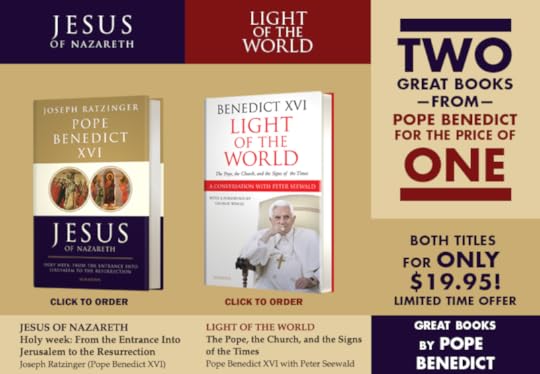Carl E. Olson's Blog, page 167
February 15, 2013
Incredible Lenten Sale on Pope Benedict Books and More!

Incredible Lenten Sale on Pope Benedict Books and More!
Offer ends March 31st, 2013 at 12:00 midnight EST.
These prices are available online only through Ignatius.com
The huge Ignatius Press Lenten sale has started ! Numerous books by/about Pope Benedict and other great authors are available now for very low prices. Jesus of Nazareth: Holy Week and Light of the World are available as a combo package for only $19.95, or individually as well! Other books such as Extreme Makeover, Max & Benedict, Christ Our Hope are available for spectacular deals. Take advantage of this great once a year Lenten sale now! To see the full listing of sale items, click here.
 Light of the World/Jesus of Nazareth: Holy Week Book Combo
Light of the World/Jesus of Nazareth: Holy Week Book Combo
What happened in the final week of Jesus of Nazareth's earthly life? In Jesus of Nazareth: Holy Week: From the Entrance Into Jerusalem to the Resurrection, Pope Benedict takes up that and other crucial questions.
Never has a Pope, in a book-length interview, dealt so directly with such wideranging and controversial issues as Pope Benedict XVI does in Light of the World.
Regular price: $44.90, sale price: $19.95
 Saved in Hope
Saved in Hope
Pope Benedict XVI
A deluxe edition of the Pope's second Encyclical, which lays out the challenges of faith today in light of the virtue of hope. Also available as an e-book and audio download.
Regular price: $14.95, sale price: $10.50
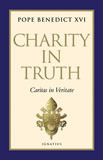 Charity in Truth
Charity in Truth
Pope Benedict XVI
A deluxe edition of the Pope's third Encyclical, which explains the Catholic approach to the economy. Also available as an e-book and audio download.
Regular price: $14.95, sale price: $10.50
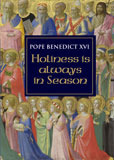 Holiness is Always in Season
Holiness is Always in Season
Pope Benedict XVI
This inspiring volume presents the Pope's numerous reflections on many saints arranged according to the calendar year. He shows how the life of each saint has something unique to teach us about virtue, faith, courage and love of Christ. The Pope exhorts us through their lives, "Be holy! Be saints!" Also available as an e-book and audio download.
Regular price: $21.95, sale price: $15.50
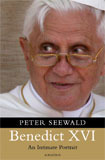 Benedict XVI
Benedict XVIPeter Seewald
Journalist Peter Seewald, who has known Ratzinger since 1992, conducted the "longest interviews in Church history" with him, for two books which were best-sellers world-wide, Salt of the Earth, andGod and the World. Now, for the first time, Seewald describes these intensive encounters in detail, and draws a portrait of this brilliant theologian who has put his life entirely at the service of the Catholic Church.
Regular price: $24.95, sale price: $12.50
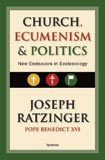 Church, Ecumenism and Politics
Church, Ecumenism and PoliticsJoseph Cardinal Ratzinger
In this collection of essays, theologian Joseph Ratzinger, now Benedict XVI, tackles three major issues in the Church today—the nature of the Church, the pursuit of Christian unity, and the relationship of Christianity to the secular/ political power. Also available as an e-book.
Regular price: $19.95, sale price: $9.95
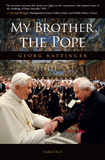 My Brother the Pope
My Brother the Pope
Georg Ratzinger, Michael Hesemann
This is not simply a book to satisfy curiosity about a "celebrity", though it certainly does that. It's a beautiful portrait of Catholic family life and, in the most literal sense, of enduring fraternal charity. Georg has a talent for telling a story, and the co-author fills in some of the larger historical background. Illustrated. Also available as an e-book.
Regular price: $24.95, sale price: $12.50
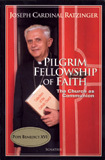 Pilgrim Fellowship of Faith
Pilgrim Fellowship of FaithJoseph Cardinal Ratzinger
Ratzinger's former students selected essays, lectures, letters, and conferences that he has written in recent years—writing that they feel best represents his position on key topics of the Catholic Church.
Regular price: $17.95, sale price: $8.95
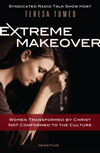 Extreme Makeover
Extreme MakeoverTeresa Tomeo
Extreme Makeovershows that it is not the slogans of the sexual revolution and the women's liberation movement that free and dignify women, but the beautiful teachings of the Catholic Church. Also available as an e-book and audio download.
Regular price: $17.95, sale price: $5.40
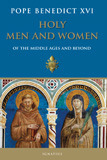 Holy Men and Women Of the Middle Ages and Beyond
Holy Men and Women Of the Middle Ages and Beyond
Pope Benedict XVI
Pope Benedict XVI continues his exploration of the greatest teachers and role models in the history of the Church. This collection goes beyond the Middle Ages and includes some Counter-Reformation saints. It concludes with a very popular saint closer to our own times who was made a Doctor of the Church by Pope John Paul II: Thérèse of Lisieux. Also available as ane-book.
Regular price: $16.95, sale price: $3.50
[image error]With God in Russia
Fr. Walter Ciszek, S.J.
Father Ciszek tells the gripping, astounding story of his twenty-three years in Russian prison camps in Siberia, how he was falsely imprisoned as an "American spy", the incredible rigors of daily life as a prisoner, and his extraordinary faith in God and commitment to his priestly vows.
Regular price: $18.95, sale price: $7.60
Christ Our Hope
This is the Official Commemorative book on Pope Benedict's 2008 apostolic visit to the USA. This lavishly illustrated, large-size edition, has dozens of photos of his historic visit, and also includes all the Pope's addresses. Large 8.5 x 10.5 coffee-table size.
Regular price: $21.95, sale price: $2.00
Max and Benedict
Jeanne Perego
This lovely illustrated book for children is a sequel to Joseph and Chico, the international best-seller that told the story of the life of the Pope from his youth through his election. This new book takes up the story of Benedict XVI's new life as the Pope. Also available as anaudio download.
Regular price: $17.95, sale price: $3.50
Chance or Purpose?
Cardinal Christoph Schönborn
Creation, Evolution, and a Rational Faith His article on evolution and creation in The New York Times launched an international controversy. In this book Schönborn responds, tackling hard questions with a carefully reasoned "theology of creation". Also available as an e-book and audio download.
Regular price: $19.95, sale price: $13.95
Indivisible
Jay Richards and James Robison
Jay Richards and James Robison tackle tough moral and political issues facing Christians today, including abortion, stem cell research, marriage, education, economics, health care, the environment, judicial activism, terrorism, free trade and more. Written to appeal to a broad spectrum of believers, Indivisible provides simple, clear arguments that Christians can use to support their beliefs in public settings.
Regular price: $21.99, sale price: $10.95
Poor Banished Children
Fiorella de Maria
An explosion is heard off the coast of seventeenth-century England, and a woman washes up on the shore. She is barely alive and does not speak English, but she asks for a priest . . . in Latin. She has a confession to make and a story to tell, but who is she and from where has she come? This historical novel raises challenging questions about the nature of courage, free will, and ultimately salvation. Also available as an e-book and audio download.
Regular price: $16.95, sale price: $8.50
Toward the Gleam
T.M. Doran
Between the two world wars, on a hike in the English countryside, Professor John Hill takes refuge from a violent storm in a cave. There he makes an astonishing discovery—an ancient manuscript housed in a metal box. Though a philologist by profession, Hill cannot identify the language used in the manuscript, but he knows enough to make an educated guess—that the book is the product of a long-lost civilization...Also available as an e-book and audio download.
Regular price: $19.95, sale price: $5.95
The Legacy of John Paul II
Joseph Ratzinger
This is a glorious tribute by Pope Benedict XVI, who honors his close friend, Pope John Paul II. This book unites these two great spiritual leaders, with over 100 photos of many striking and poignant moments of the pontificate of John Paul II. Illustrated.
Regular price: $14.95, sale price: $4.95
Pope Benedict XVI Servant of the Truth
This coffee-table book, written mainly by Peter Seewald, describes the paths of Joseph Ratzinger's life from his birthplace in Bavaria all the way to being the first German Pope in 482 years. Lavishly illustrated with over 150 photos.
Regular price: $26.95, sale price: $8.00
The True Icon
Paul Badde
In this lavishly illustrated book, Paul Badde sets out on a journey through Europe and the Holy Land as he traces the rich history of the Shroud and the Veil of Manoppello, which bears the image of the Holy Face. Also available as an e-book.
Regular price: $22.95, sale price: $11.50
The Face of God
Paul Badde
Badde embarks on an exciting quest to discover the truth behind the Holy Face of Manoppello. Unlike the Shroud of Turin, which is a "negative" of the image, the image on the face cloth is a "positive" of the face of Christ. Illustrated. Also available as an e-book and audio download.
Regular price: $19.95, sale price: $9.95
The Death of a Pope
Piers Paul Read
Juan Uriarte, an outspoken but controversial Spanish expriest, seems to be the model of nonviolence and compassion for the poor and downtrodden. Kate Ramsay, a young British reporter, sets out to uncover the truth about Uriarte and his work... but ends up in the midst of an unfolding terrorist plot to destroy the Papacy. Also available as an e-book and audio download.
Regular price: $16.95, sale price: $4.95
God's Revolution
World Youth Day & Other Cologne Talks
Pope Benedict XVI
This book includes all the texts of his talks to the youth over that five day period, as well as to Jewish, Muslim, and Protestant groups in Cologne. Also available as an e-book.
Regular price: $14.95, sale price: $2.95
Films
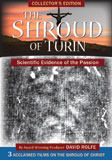 The Shroud of Turin
The Shroud of Turin
This is the definitive collection of three stunning films on the Shroud of Turin that spans 32 years of award-winning filmmaking on the Shroud by acclaimed British film producer & director David Rolfe.These films use the latest scientific, historical, medical and archaeological research on the Shroud to reveal the amazing evidence for the very strong possibility of the authenticity of it as the burial cloth of Christ. Many of the foremost experts worldwide on the Shroud were involved with the making of these films.
Regular price: $29.95, sale price: $23.96
 Changing Sides
Changing SidesThis film tells the powerful true story of the conversion of a dedicated Planned Parenthood director to a leading Pro-life Activist. This film reveals what happens when people pray, fast, sacrifice, love their enemies and take a stand on the most controversial issue of our time - abortion. Fences come down, hearts change, and the love of God shines light in the darkest, most unexpected places. And the evil of abortion is exposed and defeated.
Regular price: $14.95, sale price: $11.96
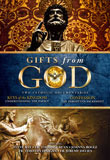 Gifts From God
Gifts From GodThis new DVD has two excellent documentary films, one on the papacy titled Keys of the Kingdom: Understanding the Papacy, and the other titled Confession: The Forgotten Sacrament. Both films feature expert priests and theologians presenting in-depth commentary on these two sublime spiritual gifts from God to humanity through the Church, revealing the powerful spiritual significance of the papacy and confession for Catholics.
Regular price: $19.95, sale price: $7.95
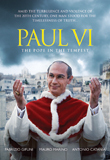 Paul VI
Paul VI
Pope Paul VI was a leader in the Catholic Church as a priest, bishop, cardinal and pope through one of the most difficult periods in its history—from the Fascist regime and World War II to the constitution of the Italian Republic, from the Second Vatican Council to the protests and the terrorist attacks of the 1960s and 1970s. This exciting and insightful film covers fifty years of history that changed the Catholic Church and the world. Paul VI: The Pope in the Tempest is a story that draws emotion and lessons from history itself, dramatically mixing stunning reconstructions and real film footage.
Regular price: $19.95, sale price: $15.96
 Lourdes
Lourdes
Bernard, a non-Christian French journalist, is assigned a story on Lourdes in the late 1990s. Just before he leaves for Lourdes, Bernard learns that his wife is pregnant. However, he is not told that this pregnancy is risky—and that doctors are suggesting an abortion. While researching for his report on Lourdes, Bernard comes across the pages of an old family manuscript. The manuscript was written by his ancestor, Henri, an atheist scientist who met Bernadette at Lourdes in 1858 This intriguing film uses the pages of the manuscript to trace the stories of three lives— Bernadette, Henry and Bernard.
Regular price: $19.95, sale price: $15.96
Jesus of Nazareth
Zeffirelli's award-winning film with an all-star cast that depicts the life of Christ from His birth through His Resurrection. This epic production is acclaimed for its thorough Biblical and historical accuracy, with six hours of superb acting, beautiful music, and outstanding cinematography. This powerful film brings you closer to Christ and will be a blessing for every home.
Regular price: $24.95, sale price: $19.96
The Passion of the Christ - Definitive Edition
This deluxe two-disc DVD of the epic film by Mel Gibson is a great addition to any Catholic's movie collection. Featuring a behind-the-scenes documentary, another documentary on the life of Christ, deleted scenes, two versions of The Passion, commentary from Gibson and the writers, production art and trailers, historic images of Christ, and much more!
Regular price: $21.95, sale price: $17.56
Did Jesus Really Rise from the Dead?
Skeptics have long tried to show that there was no Resurrection. Did Jesus Really Rise from the Dead? carefully scrutinizes the historical evidence. Top scholars and biblical historians critically examine alternative explanations. In the end, they show why it is a matter of sound reason as well as faith to affirm what the early Church proclaimed: Jesus is risen.
Regular price: $14.95, sale price: $11.96
The Holy Face
Two inspiring new documentary films on one DVD, The Holy Face and The Human Face of God, that tell about the discovery of the amazing relic of the Holy Face on a cloth revered in a Church in Manoppello, Italy. Paul Badde, author of the international best-selling book on the Veil of Manoppello, The Face of God is a featured spokesman in both films that takes us to the Church in Italy to see this amazing cloth up close, and to learn the mysterious history that surrounds it.
Regular price: $19.95, sale price: $9.95
The Truth Exposed
A power-packed apologetics film featuring five well-known converts to Catholicism — Scott Hahn, Marcus Grodi, Jeff Cavins, Joetta and Larry Lewis. Each has a unique and inspiring story to tell of his road to Rome and what he had to overcome to become a Catholic. A great film to strengthen Catholics in their faith, and for non-Catholics to consider taking the same journey.
Regular price: $19.95, sale price: $7.95
After the Truth
This powerful, award-winning German film tells the story of one of the greatest challenges the legal system has ever faced. Dr. Josef Mengele, the infamous "Angel of Death" in Auschwitz, and one of the most wanted Nazi war criminals, turns himself in after 30 years in hiding to tell his "truth" to the world. Thus ensues a battle between conscience and evil...
Regular price: $14.95, sale price: $5.95
The Last Things
This film presents the reality of death and what will follow for every person: first the particular Judgment before God, then Heaven or Hell as our destination for all eternity. The Catholic teaching on Purgatory is also explained, giving examples from the Scriptures and philosophy.
Regular price: $14.95, sale price: $11.96
The Angel of Biscay
Filmed on location in many beautiful locations, the film illustrates the character, mission and spirituality of a truly remarkable priest who changed the lives of so many, especially through his deep love for, and his efforts to spread devotion to, the Holy Eucharist and the Immaculate Heart of Mary.
Regular price: $14.95, sale price: $7.95
Paul of Tarsus
Paul of Tarsus was the greatest evangelizer of first century Christianity, the biggest contributor to the New Testament, the most influential early Christian missionary, and one of Rome's most famous citizens. This fast paced and insightful film takes you on the journey of Paul the Apostle, from his dramatic conversion at Damascus to his total commitment to spreading the Word of God at all costs, to his condemantion and death in Rome.
Regular price: $14.95, sale price: $5.95
Into Great Silence
In this contemplative documentary from filmmaker Philip Gröning, the Grande Chartreuse monastery opens its doors to the public for the first time since being founded by St. Bruno in 1084 to offer an intimate look at a lifestyle rarely experienced by those outside of the brotherhood. This transcendent film is one of the most mesmerizing and poetic chronicles of spirituality ever created.
Regular price: $29.95, sale price: $23.96
Catholic World Report
Homiletic & Pastoral Review
Legislation creating ”same-sex” marriage: What’s at stake?
by Cardinal Francis George, O.M.I.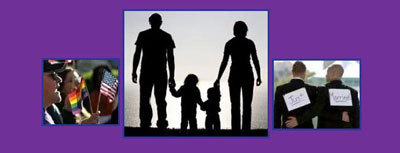
Marriage comes to us from nature … neither Church nor State invented marriage, and neither can change its nature.
At the beginning of the New Year, 2013, a law is being proposed in the General Assembly to change the legal definition of marriage in Illinois to accommodate those of the same sex who wish to “marry” one another. In this discussion, the Church will be portrayed as “anti-gay,” which is a difficult position to be in, particularly when families and the Church herself love those of their members who are same-sex oriented. What’s at stake in this legislative proposal and in the Church’s teaching on marriage?
For Additional Sale Items Click HERE!
Items are not sold on approval.
Periodically we make available -- only to you, our valued repeat customers -- special offers which are not available to the general public. We offer these discounted prices as our gift to those who help us by using Ignatius.com. Please do not ask for retroactive price consideration. We cannot accommodate those requests. Many thanks.
The Last Homily
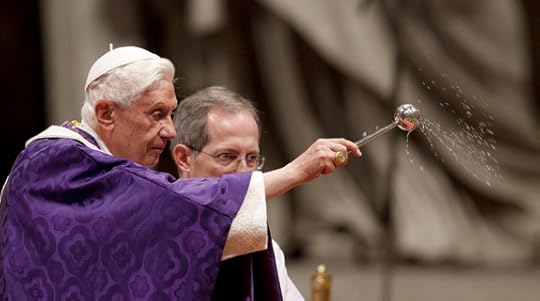
The Last Homily | William L. Patenaude | Catholic World Report
Benedict XVI's Ash Wednesday homily emphasized again his pastoral and pontifical priorities
The Ash
Wednesday homily given by Pope Benedict XVI—the last we will hear from this
pope—demonstrated the pastoral and pontifical priorities of the son of Joseph
and Maria Ratzinger—of the priest that seeks to decrease so that Christ may
increase.
Pope Benedict began
his homily not with himself but with the image of the many “gathered around the
tomb of the Apostle Peter.” In doing so he positioned his homily squarely in that
particular liturgy. He spoke to those people that were facing that altar, which fittingly for the occasion
stands over the tomb of the first pope. Certainly, the Successor of Peter meant
to instruct his worldwide flock, but he did so by addressing the individual men,
women, and prelates in his presence.
Liturgy is,
after all, a great deal about the people around you.
Given that holy
place and the words of scripture proclaimed, Pope Benedict could uniquely focus
on topics at the center of his theological and pastoral career: the place of
the human person and the Church in salvation history; the reality of sin and
the need for the Cross and for grace; and the transformative, loving ministry that
all who claim Christ as their Lord are called to.
The pontiff structured his final homily around
the Ash Wednesday invitation from the Book of Joel: “return to me with all your
heart, with fasting, with weeping, with mourning” (2:12). This invitation is
not a sentimental one. Pope Benedict made clear—as he has so often—that this
plea by the Lord of Hosts is for a (probably painful) reorientation of one’s
heart to the will, grace, and glory of God.
February 13, 2013
"Great Lent" by Thomas Howard

Great Lent | Thomas Howard | From Evangelical Is Not Enough: Worship of God In Liturgy and Sacrament
Presently Lent arrives. This is the forty days leading up to Easter, which also recall the forty days of Christ's temptation in the wilderness. There is a telescoping of things here, since His temptation did not in actual fact immediately precede His Passion, but "liturgical time" is such that spiritual significance may override chronological exactness.
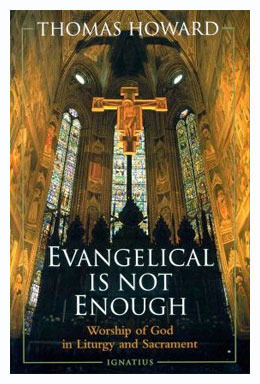
Lent, like Advent, is a time of penitence. Here we identify ourselves with the Lord's fast and ordeal in the wilderness, which He bore for us.
This raises a point worth noting in passing. There are some varieties of Protestant theology and spirituality that so stress "the finished work of Christ" and the fact that He accomplished everything, that they leave no room at all for any participation on our part. Such participation, encouraged by the ancient Church, does not mean that we mortals claim any of the merit that attaches to Christ's work, much less that we can by one thousandth particle add to His work. Nevertheless, the gospel teaches us that Christians are more than mere followers of Christ. We are His Body and are drawn, somehow, into His own sufferings. We are even "crucified" with Him.
My own tradition stressed this, but it was taught as a metaphor that meant only the putting to death of sin in our members. There was very little said about the sense in which Christ draws His Body into His very self-giving for the life of the world and makes them part of this mystery. Saint Paul uses extravagant language about his own filling up "that which is behind of the afflictions of Christ." We had succinct enough explanations as to what he might have meant here, but these explanations allowed no room for any notion of our participating in Christ's offering. This was looked upon as heresy, violating the doctrine of grace .n which all is done by God and nothing by us. We are recipients only. That the gracious donation of salvation by God could in any manner include His making us a part of it all, as He made the Virgin Mary an actual part of the process, and as Saint Paul seems to teach, was not the note struck.
The ancient Church, in its observance of Lent, once more asks us to move through the gospel with Christ Himself. The most obvious mark of Lent to a newcomer is the matter of fasting. I had own about this practice all my life. My Catholic playmates would give up chocolates or Coke or ice cream for Lent. I also knew that a few devout people in my own tradition of evangelicalism practiced fasting now and again for special purposes—a time of especially concentrated prayer, for example.
I myself thought of Lenten fasting and also of the old Catholic practice of refusing meat on Fridays as being legalistic, and perhaps even heretical, since it seemed to entail some notion of accruing merit. Since Christ had done all, why should we flagellate ourselves this way? Was it not a return to the weak and beggarly elements condemned by Saint Paul? Was it not to be guilty of the very thing that the apostle had a sailed the Galatian Christians for?
I discovered that the ancient Church teaches just what the New Testament teaches on the point, namely, that fasting is a salutary thing for us to undertake. Jesus fasted and assumed that His followers would. "When ye fast," He said, not "if." Saint Paul both practiced it and taught it. It seems to constitute a reminder to u that our appetites are not all and that man shall not live by bread alone. Furthermore, if we may believe the universal testimony of Christians who do practice it, it also clarifies our spiritual vision somehow. Lastly, it is a token of the Christian's renunciation of the world. There is nothing that a Christian will insist he must have at all costs. Fasting supplies an elementary lesson here.
Lent asks us to ponder Christ's self-denial for us in the wilderness. It draws us near to the mystery of Christ's bearing temptation for us in His flesh, and of how in this Second Adam our flesh, which failed in Adam, now triumphs.
Lent also leads us slowly toward that most holy and dread of all events, the Passion of Christ. What Christian will want to arrive at Holy Week with his heart unexamined, full of foolishness, levity, and egoism? To those for whom any special observances hint of legalism or superstition one can only bear witness that the solemn sequence of Lent turns out to be something very different from one's private attempts at meditating on the Passion. To move through the disciplines in company with millions and millions of other believers allover the world is a profoundly instructive thing.
Lent begins with Ash Wednesday. The first time ashes were imposed on my forehead, I found a cacophony of voices inside me: "Come! Now you have betrayed your background! This is straight back to the Dark Ages. Fancy Saint Paul's doing this!"
I knew it was not so when the priest came along with the little pot of damp ashes and with his thumb smudged my forehead—my forehead, the very frontal and crown of my dignity as a human being!—and aid, "Remember, O man, that dust thou art and unto dust thou shalt return."
I knew it was true. I would return to dust, like all men, but never before had mortality come home to me in this way. Oh, I had believed it spiritually. But surely we need not dramatize it this way....
Perhaps we should, says the Church. Perhaps it is good for our souls' health to recall that our salvation, far from papering over the grave, leads us through it and raises our very mortality to glory. We, like all men, must die. I felt the strongest inclination to wave the priest past as he approached me in the line of people kneeling at the rail. Not me—not me—like Agag coming forth delicately, hoping that the bitterness of death was past. Yes, you. Remember, O man....
I was beginning to learn that when we encounter some "spiritual" truth in ourbodies, it is brought home to us. We can meditate on suffering all day long, for example, but let us have migraines, and we know something we could not have known through merely mulling over the doctrine of suffering. We can meditate on love all day long, but let us kiss the one we long for, and we know immediately something we could not have known if we had thought about love for a thousand years. Nay—our very salvation came to us in the body of the incarnate God. "O generous love! that He who smote/In Man for man the foe,/The double agony in Man/For man should undergo," says Cardinal Newman's hymn. The ashes effected something in me more than a smudge on my forehead. I had felt, if only for a moment, the thing that I wished most earnestly to be exempted from: death.
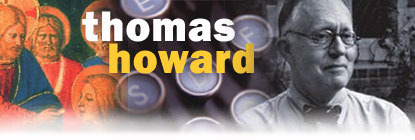
• Thomas Howard biography
• Thomas Howard Books Published by Ignatius Press
• Interviews and Book Excerpts
Related Ignatius Insight Articles:
• Lent: Why the Christian Must Deny Himself | Brother Austin G. Murphy, O.S.B.
• The Old Age and the New | Thomas Howard | From Chance or the Dance?
• "I never thought I wanted to be a writer" | An Interview with Dr. Thomas Howard
• Catholic Spirituality | Thomas Howard | From The Night Is Far Spent
• Reading T.S. Eliot's "Four Quartets" | An Interview with Dr. Howard about Dove Descending: A Journey Into T.S Eliot's Four Quartets
• Thomas Howard and the Kindly Light | An Interview with Dr. Howard about his book, Lead, Kindly Light
• An Hour and a Lifetime with C.S. Lewis | An Ignatius Insight Interview with Dr. Thomas Howard
• "Tradition" | Chapter 14 of On Being Catholic | Thomas Howard
• The Quintessential – And Last – Modern Poet | Fr. George William Rutler | The Foreword to Dove Descending: A Journey Into T.S. Eliot's Four Quartets,by Thomas Howard
Thomas Howard was raised in a prominent Evangelical home (his sister is well-known author and former missionary Elisabeth Elliot), became Episcopalian in his mid-twenties, then entered the Catholic Church in 1985, at the age of fifty. He is an acclaimed writer and scholar, noted for his studies of Inklings C.S. Lewis ( Narnia & Beyond: A Guide to the Fiction of C.S. Lewis) and Charles Williams (The Novels of Charles Williams), as well as books including Christ the Tiger, Chance or the Dance? , Hallowed be This House, Evangelical is Not Enough , If Your Mind Wanders at Mass , On Being Catholic , The Secret of New York Revealed , and Lead, Kindly Light: My Journey to Rome , the story of his embrace of Catholicism, and Dove Descending: A Journey Into T.S. Eliot's Four Quartets . Visit his IgnatiusInsight.com author page here.
Lent: Why the Christian Must Deny Himself

Lent: Why the Christian Must Deny Himself | Brother Austin G. Murphy, O.S.B.
We still ask ourselves as Ash Wednesday approaches, "What am I doing for Lent? What am I giving up for Lent?" We can be grateful that the customs of giving up something for Lent and abstaining from meat on Fridays during Lent have survived in our secular society. But, unfortunately, it is doubtful that many practice them with understanding. Many perform them in good faith and with a vague sense of their value, and this is commendable. But if these acts of self-denial were better understood, they could be practiced with greater profit. Otherwise, they run the risk of falling out of use.
A greater understanding of the practice of self-denial would naturally benefit those who customarily exercise it during Lent. Better comprehension of self-denial would also positively affect the way Christians live throughout the year. The importance of self-denial can be seen if we look specifically at fasting and use it as an example of self-denial in general. Indeed, fasting, for those who can practice it, is a crucial part of voluntary self-denial.
But since we live in a consumerist society, where self-indulgence rather than self-denial is the rule, any suggestion to fast will sound strange to many ears. It is bound to arouse the questions: Why is fasting important? Why must a Christian practice it? Using these questions as a framework, we can construct one explanation, among many possible ones, of the importance of self-denial.
To answer the question "Why must the Christian fast?" we should first note that fasting, in itself, is neither good nor bad, but is morally neutral. But fasting is good insofar as it achieves a good end. Its value lies in it being an effective means for attaining greater virtue. And because it is a means for gaining virtue– and every Christian ought to be striving to grow in virtue–there is good reason to fast.
Some people point out that fasting is not the most important thing and, therefore, they do not need to worry about it. Such reasoning displays a misunderstanding of our situation. But, since the excuse is common enough, some comments to refute it are worthwhile.
Doing Small Things Well
First, while it is true that fasting is not the most important thing in the world, this does not make fasting irrelevant or unimportant. There are, certainly, more urgent things to abstain from than food or drink, such as maliciousness, backbiting, grumbling, etc. But a person is mistaken to conclude that he therefore does not need to fast. He should not believe that he can ignore fasting and instead abstain in more important matters. Rather, fasting and avoiding those other vices go hand in hand. Fasting must accompany efforts to abstain in greater matters. For one thing, fasting teaches a person how to abstain in the first place.
Moreover, it is presumptuous for a person to try to practice the greater virtues without first paying attention to the smaller ones. As Our Lord says, "He who is faithful in a very little is faithful also in much" [1] and so can be trusted with greater things. Therefore, if a person wants to be able to abstain in greater matters he must not neglect to abstain in smaller matters, such as through fasting.
Finally, there is a subtle form of pride present in the person who says that because something is not very important, he does not need to do it. Whoever makes such a claim implies that he does only important things. But the average person is rarely called to do very important things. Accordingly, each person is more likely to be judged on how he did the little, everyday things. Even when, rarely, a person is called to do a great work, how often does he fall short? All the more reason, then, for a person to make sure that he at least does the small things well. Furthermore, if he truly loves the Lord, he will gladly do anything–big or small–for him. So, in the end, saying that fasting is not the most important thing is not a good excuse for avoiding it.
What, then, is the reason for fasting?
To answer this let us first clarify what fasting entails. It involves more than the occasional fast, such as on Good Friday. To be effective, fasting requires disciplined eating habits all the time. There are certainly days when a person should make a greater effort at abstaining from food and drink. These are what we usually consider days of fasting and they must be practiced regularly. But, still, there are never days when a person is allowed to abandon all restraint. A person must always practice some restraint over his appetites or those periodic days of fasting arc valueless. Always keeping a check on his desires, a person develops good habits, which foster constancy in his interior life. So, in addition to practicing days of fasting on a regular basis, a person should continuously restrain his desires, such as those that incline him to eat too much, to be too concerned with what he eats, or to eat too often. [2]
We might, then speak of the discipline of fasting in order to avoid the impression that fasting is sporadic. The operative principle behind the discipline of fasting is simple: to limit yourself to only what is necessary for your physical and psychological health–no more, no less. St. Augustine puts it concisely when he teaches: "As far as your health allows, keep your bodily appetites in check by fasting and abstinence from food and drink." [3] So, fasting is meant only to keep a person's unnecessary wants in check. A person is not– nor is he permitted–to deny himself what is necessary for his health. The discipline of fasting instead asks a person to check his desires for what is superfluous and not necessary.
Realizing True Well-being
Consequently, fasting should not threaten a person's health. And there is no foundation for believing that fasting is somehow motivated by anti-body sentiments. Fasting actually does good for the body by helping it realize its well-being. The body needs to be in conformity with the spirit and this requires such disciplines as fasting. In this way, the body is like a child. Children would never realize their true well-being if their parents never told them "no," but gave in to every one of their desires. In the same way, if a person never says "no" to his bodily desires, his body will never realize its true well-being. That is, the body needs such discipline to be brought into conformity with the spirit. For otherwise, it cannot share in the spiritual blessings of Christ.
This makes perfect sense when we consider that the human person is not just a soul, but is matter as well. A person’s body, too, is to be renewed in Christ. Fasting is one way that a person brings about a harmony between body and soul, so that being made whole he can be one with Christ.
The Christian belief that the body is intimately united to the soul should also make a person suspicious of the opinion that fasting is merely external. External acts stem from the desires of the heart within, as Our Lord says in the Gospel. [4] So, a person's external acts are linked to his interior desires. The external act of abstaining from food and drink, therefore, clearly affects a person internally. It does not permit his desires within to reach fulfillment. Thus fasting has the ability to keep interior desires in check, which is important for improving a person's interior life.
It is true, of course, that a person should be more vigilant over his interior life than over his external actions. He must be attentive to interior motives, desires, intentions, to make sure that his fasting is affecting his interior life as it ought–and not giving rise to pride, anger, or impatience.
In fact, only by considering the interior self, and how fasting can affect it, does one see the high value of fasting. If someone looks only at the external act of eating, and does not consider the underlying internal desires of the heart, then the value of fasting cannot be seen. For, clearly, there is nothing wrong with the very act of eating. Nor do the enjoyments of food and the pleasures of eating, as such, harm a person. The joys and comforts of eating are good. Like all created goods, they testify to the goodness of God, who made them. Therefore, the enjoyment of eating and drinking manifests the goodness of God. A person ought to see God's goodness in the joys of these things, and give God thanks for them. [5] The enjoyment of food can then actually help lift the mind and heart to God. [6]
But by lifting a person's gaze to God, created goods point beyond themselves, to greater joys. Consequently, he who truly enjoys God's goodness in created things, such as food and drink, will not remain attached to them. Rather, he will go beyond them, readily giving them up, in order to enjoy the higher things, which St. Paul says we must seek. [7]
Seek What Is Better
This might lead some to ask: If the enjoyment of eating does me no harm, and can in fact manifest God's goodness, why sacrifice this joy by fasting? That is, why check my unnecessary desires for what is enjoyable? After all, there is nothing wrong with enjoying food. Why, then, if I enjoy having a snack, or eating fine foods, sacrifice these things? Again, they are not bad or sinful.
The answer is: Because it is better. Having a tasty meal prepared just to my liking is good, but it is better to sacrifice such things. Showing why it is better to fast than to neglect fasting will provide the reason why a Christian is expected to fast.
A Christian must be seeking what is better, and not merely trying to avoid what is bad. This is the only way to live a life of continual conversion, to which we are committed by baptism. The Christian must face decisions with the question: "What is the better thing for me to do?" He must not, when he has a decision to make, approach what he is inclined to do with the justification: "Well, there is nothing wrong with doing it." If that is his approach, then he is not genuinely seeking improvement in his life. Spiritual progress becomes impossible.
Ongoing conversion, to which, again, the Christian must be dedicated, involves going from good to better. This conversion is unreachable for him who in his life refuses to give up the lesser goods in order to attain greater goods. Due to fallen human nature, every person is prone to be complacent. Each of us is reluctant to change his ways. But clearly, if a person has not yet reached perfection, there are certainly greater goods for him to realize. Fasting, in many ways, is simply the choice to give up lesser goods for greater ones, to abstain from the joys of food and drink in order to attain greater joys from God. It seeks for more. If a person ever stops seeking for more, then he has stopped seeking God.
Why is it better to fast than not to fast? Again, we said that the enjoyment of food and drink is good. Enjoying food is not the problem. Fasting does not tell a person not to enjoy eating–I think this is impossible–as much as it says not to seek the enjoyment of eating. A person may take the joys of food as they come, and be grateful for them: but he should not pursue such joys.
True, there are legitimate occasions, such as when entertaining guests, where especially enjoyable foods are procured. But this is done for the sake of hospitality and for lifting up the heart and mind to God in thanksgiving. The joys of food and drink are not sought, consequently, for their own sake but for God's glory. Thus, the person is not really seeking the joys of eating and drinking, as such: he uses them only to pass beyond them to God. Hence, he who uses the joys of eating and drinking rightly will readily give them up. Because fasting is better than not fasting, he will deny himself these joys regularly. "Looking to the reward," [8] moreover, he will not often make the excuse that hospitality, or the "need" to celebrate, requires that he allow himself enjoyable foods. In truth, it is more often the case that self-denial and restraint are called for. [9]
Obstacles To Grace
So, it is not wrong, in itself, to seek tasty, enjoyable food: but still a person should not do so. For when a person seeks the enjoyment of eating, his action is tainted with inclinations to sloth, complacency, and self-love. [10] That is, his motives are mixed. For when he seeks the joys of food, selfish inclinations are at work in his heart along with whatever good motives there might be. Now, if a person only looks at the external act of eating or the objective value of enjoying food, he will not see this. But, if he honestly looks into the heart, he will see that sloth, complacency, and self-love are present in the desire for the joys of eating. Having such mixed motives is simply part of our imperfect condition in this world.
These selfish inclinations in a person's heart, which are present when he seeks the enjoyment of eating, are the sort of things that hinder a person's growth in holiness and virtue. To grow in holiness and virtue every person needs God's help–we know that a person cannot do it on his own. As Christ says, "Apart from me you can do nothing." [11] Hence, the help of God's grace is needed to grow in virtue and to live a life of continual conversion. Yet the presence of these inclinations to sloth, complacency, and self-love get in the way of a person's reception of God's grace. They are obstacles to receiving more grace.
Therefore, the Christian, who is dedicated to conversion, must remove these obstacles from his heart, so that he may receive more grace and become a better follower of Christ. A person should not expect God to force his grace on him without his consent. As we know, God chooses to work with a person's cooperation. And, so, he is obliged to work with God to remove these inclinations from his heart as much as possible.
This is done by fasting. For fasting, by checking a person's desires for what is not necessary, teaches him to seek what is sufficient when he eats. When he fasts, he does not seek the enjoyment of food, but is simply seeking what he needs to eat and drink. And since he is no longer pursuing the joys of food, the self-centered inclinations that accompany this pursuit are not allowed a chance to spring up in his heart. A person gives up things he enjoys because in so doing he denies inclinations such as sloth, complacency, and self-love a chance to be active in his heart.
Purifying The Heart
This is why it is better to fast. Fasting removes these obstacles so that being more receptive to God's grace, a person will grow in holiness and virtue. The self-centered inclinations that accompany pleasure-seeking are not directed towards God–therefore, they do not lead the heart to God but away from him. Their presence in the heart creates a divided heart–a heart, which does not completely look to God for its needs. As St. Augustine teaches, a divided heart is an impure heart. [12]
Purifying the heart, then, will involve denying oneself the pursuits of pleasures in things like food and drink. For thus a person protects his heart from the self-centered inclinations that are bound to coexist with these pursuits.
This provides one answer to the question, "Why must we fast?" (and, by extension, to the question, "Why should one practice self-denial?"). Since, by fasting, a person no longer seeks after the joys of food and drink, the heart is set free to focus more completely on God. By turning away from his concerns for the pleasures of eating, he can turn more wholeheartedly to God. And this, we know is what continual conversion is all about.
By fasting, then, a person turns to God more intently. This is reflected in God's words spoken through the Prophet Joel: "Return to me with all your heart, with fasting, with weeping, and with mourning." [13] Naturally, a person is reluctant to give up through fasting things he enjoys–but by doing so he turns his attention to God and waits for him. He places his trust in him that he will give him the joy he needs–joys "greater than when grain and wine abound." [14] But he has to trust and be willing to persevere through the dry times that will accompany fasting. If he puts his hope in God, however, the Scriptures assure him that he will not be disappointed. [15]
For the sake of his ongoing conversion, then, the Christian must fast. But we might add another, better reason for fasting. Not only does fasting benefit a person's own individual spiritual progress, it also benefits his neighbor.
It is commonly pointed out that fasting can help others by allowing those who fast to increase their almsgiving with the money saved from eating less. But the benefit referred to here is of a different sort. It is due to our being connected with each other through prayer, so that a person's offering of prayer can help others. Now, prayers for others are more effective the more united the person praying is to Christ, since Christ is the source of the benefits gained through prayer. So the more converted a person becomes to the Lord, the more effective his prayers for others: "The prayer of a righteous man has great power in its effects." [16] And since fasting aids a person's continual conversion, it strengthens his prayers so that they benefit others more. In this way, he can help his neighbor through fasting.
Moreover, this service to his neighbor through fasting is an imitation of Christ. He offered himself on the Cross for others. A person too, in union with Christ, offers himself through the sacrifice of fasting. In fasting, he has the opportunity to join Christ in offering himself for the sake of others. Thus, even if a person's heart were pure and always free from selfish inclinations–as was Christ's–he should still fast–as did Christ. Through Christ he has the chance of helping others through voluntary acts of self-denial. Christian love is, indeed, eager for such chances to serve others.
So, in a very real way that is clearly visible to the eyes of faith, the Christian must fast out of love of neighbor. He is commanded by Jesus to live in his love. [17] This love is the love that compels a person "to lay down his life for his friends." [18] That is, it is the love that compels him to sacrifice his own preferences and desires on behalf of others. And this is what each person is invited to do through fasting– to give up things he enjoys for the benefit of others. And, as we are told, "there is no greater love than this." [19]
There are good reasons then, why a person must practice fasting and develop disciplined eating habits. Fasting and, by extension, self-denial are important for a person's continual conversion as well as for others who need our prayers. So, the Christian should regularly ask himself, "What do I really need? What can I do without?" and consider the advantages of denying himself even things that are not necessarily bad.
A better understanding of the virtue of denying oneself would undoubtedly benefit our society, where one is taught only how to say, "yes" to what one wants and desires. The practice of self-denial provides a humble yet profound way of giving oneself to God and others out of love, thus breaking the tendency to self-absorption. For, as we have said, self-denial is necessary for helping bring about ongoing conversion, which is sought out of love of God: and one restrains oneself and sacrifices one's desires out of love of neighbor. Love, then–real liberating, sacrificial love–is behind voluntary self-denial.
This article was originally published in the February 2000 issue of Homiletic & Pastoral Review.
ENDNOTES:
[1] Luke 16:10.
[2] John Cassian Institutes 5.23.
[3] Augustine Rule 3.1.
[4] Luke 6:45.
[5] 1 Tim. 4:3-5.
[6] The theme of the mind ascending from created goods to God, the Ultimate Good, is common among spiritual writers. The spiritual master, Saint John of the Cross, refers to it in The Ascent of Mount Carmel (trans. Kieran Kavanaugh, O.C.D., and Otilio Rodrigues, O.C.D., in The Collected Works of St. John of the Cross [Washington, D.C.: Institute of Carmelite Studies Publication, 1979]) 3.24.3-7,3.26.5-7. For a more recent discussion on the subject, see Dietrich von Hildebrand Transformation in Christ (Garden City, N.Y.: Image Books, 1963) 192-193.
[7] Col. 3:1-2.
[8] Heb. 11:26.
[9] For further insights into this subject, see Saint John of the Cross, op. cit.
[10] See Dietrich von Hildebrand In Defense of Purity (New York: Sheed and Ward Inc., 1935) 150-156.
[11] John 15:5.
[12] Augustine The Lord's Sermon on the Mount 2.11.
[13] Joel 2:12.
[14] Ps 4:8.
[15] Rom. 5:5: Ps 22:5.
[16] Jas. 5:16.
[17] John 15:9.
[18] John 15:13.
[19] Ibid.
Related IgnatiusInsight.com Articles:
• The Premises of Gospel Poverty | Fr. Thomas Dubay, S.M.
• Lent and "Our Father": The Path of Prayer | Carl E. Olson
• Thirsting and Quenching | Fr. Thomas Dubay, S.M.
• Seeking Deep Conversion | From Deep Conversion, Deep Prayer | Fr. Thomas Dubay, S.M.
• "Lord, teach us to pray" | From Earthen Vessels | Gabriel Bunge, O.S.B.
• The Religion of Jesus | From Christ, The Ideal of the Priest | Blessed Columba Marmion
• Blessed Columba Marmion: A Deadly Serious Spiritual Writer | Christopher Zehnder
• Seeing Jesus in the Gospel of John | Excerpts from On The Way to Jesus Christ | Joseph Cardinal Ratzinger
• Encountering Christ in the Gospel | Excerpt from My Jesus | Christoph Cardinal Schönborn
• The Liturgy Lived: The Divinization of Man | Jean Corbon, OP
• Understanding The Hierarchy of Truths | Douglas Bushman, STL
• The Eucharist: Source and Summit of Christian Spirituality | Mark Brumley
Brother Austin G. Murphy, O.S.B., is a member of St. Procopius Abbey in Lisle, Ill. He was born in Huntington, L.I., and grew up in Suffern, N.Y. In December of 1995 he received his B.A. in Economics from the University of Chicago. While in formation and preparation to take solemn vows at St. Procopius Abbey, he teaches high school mathematics at the abbey’s high school, Benet Academy.
Tell Me I’m Not Good Enough: An Ash Wednesday Request
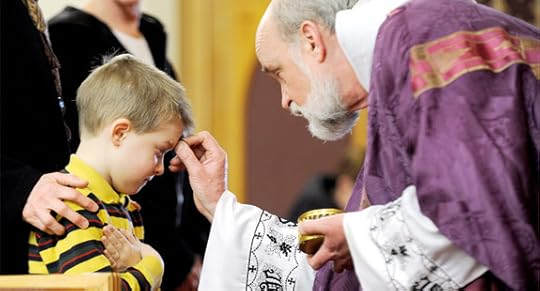
Tell Me I’m Not Good Enough: An Ash Wednesday Request | David Paul Deavel | Catholic World Report
Those who come to be marked by ashes are looking for what might be called the “bad news of the Gospel.”
“Because they know I’m not good enough.”
The answer was emphatically not what I was expecting. “Janet” (not her real name), raised Catholic and Lutheran in spots and now “nothing” (her words), had been saying how she missed ritual and the touch of God in her life. She wanted these for her husband and children, too. I was encouraging her to come back to Catholic faith when she declared that the only group she felt comfortable belonging to was the local organic foods co-op. I asked her why, expecting something about the co-op’s “openness” and “acceptance.”
But she said it very plainly: “Because they know I’m not good enough.”
Janet is certainly not like “Mrs. Begorrah,” the character in Bernard Basset’s novel Priest in the Presbytery, “who was easiest to please, for she asked no more of the [preacher] than plenty of hell-fire. . .”. Janet does not like threats. But she does like truth. And the truth is that she feels a discontent with herself that is not simply the result of low self-esteem or a slightly-off brain chemistry or unrealistic expectations or a dysfunctional family background. The co-op, while accepting her, says without qualm that her lifestyle is unhealthy and she needs to change to be healthy and right with Nature. But the discontent is still there.
Janet might be religiously “nothing” now but she is disturbed. And in her disturbance is a lesson for the preacher on Ash Wednesday.
Two great books from Pope Benedict for the price of one
February 12, 2013
New: "A Sense of the Sacred: Roman Catholic Worship In The Middle Ages"
Now available from Ignatius Press:
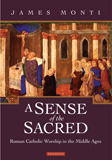 A Sense of the Sacred: Roman Catholic Worship In The Middle Ages
A Sense of the Sacred: Roman Catholic Worship In The Middle Ages
by James Monti
This incomparable volume presents a comprehensive exploration and explanation of medieval liturgical celebrations. The reverent prayers, hymns and rubrics used in the Middle Ages are described in detail and interpreted through the commentary of scholars from the same time period, the era which is also known as the "Age of Faith".
Collected here is a wide range of ceremonies, encompassing the seven sacraments, the major feasts of the liturgical year (such as Christmas, Easter, and Corpus Christi), and special liturgical rites (from the coronation of the pope to the blessing of expectant mothers). The sacred celebrations have been drawn from countries across western and central Europe-from Portugal to Poland-but particular attention has been given to liturgical texts of medieval Spain, which until now have received relatively little attention from scholars.
Historian James Monti has done exhaustive research on medieval liturgical manuscripts, early printed missals, and the writings of medieval liturgists and theologians so that the treasures they contain can inspire a sense of the sacred in future generations of Catholics.
James Monti is an author and historian who has contributed numerous articles to Catholic publications, including the monthly missal Magnificat. His other books include The King's Good Servant But God's First: The Life & Writings of St. Thomas More, The Week of Salvation and In the Presence of Our Lord.
"James Monti's treatise is an astonishing achievement, a book that can and will shape a new generation of intellectuals who are serious about the Catholic liturgy. Despite the title, this book is not only about medieval liturgy. It's about inspiring the creation of, and the provision of access to, truly sacred spaces in our time, even in a world that seems so barren of them. My own special interest is in Gregorian chant, but Monti's book helps broaden the picture to include a spiritual panorama of extraordinary breadth and depth. We have so much to learn from the past and so much to work toward for a bright and beautiful future of recaptured truth. "
- Jeffrey Tucker, Managing Editor, Sacred Music
"Among the ambiguous legacy of the Liturgical Movement of the twentieth century is the neglect and incomprehension of medieval liturgy. This book is a welcome contribution towards redressing this imbalance. James Monti recovers the tradition of mystical commentary on the sacred rites, a common heritage of East and West, and enriches it with his vast historical erudition. This volume will serve as a useful resource for anyone who wishes to enter into the spirit of the liturgy that shaped a millennium of Christian history."
- Fr Uwe Michael Lang, Cong.Orat., Author, Turning Towards the Lord
"James Monti's profound faith and incomparable scholarship shine in A Sense of the Sacred. This beautiful book, packed with amazing details and fascinating facts, makes the mystical richness of the Church's sacraments and sacred rituals come alive. One is struck with awe at the wonder of Catholic worship. This remarkable volume is clearly the fruit of one who deeply loves the liturgy and lives the mystery."
- Fr. Peter Cameron, O.P., Editor of Magnificat
February 11, 2013
Pope cites waning strength as reason for resignation
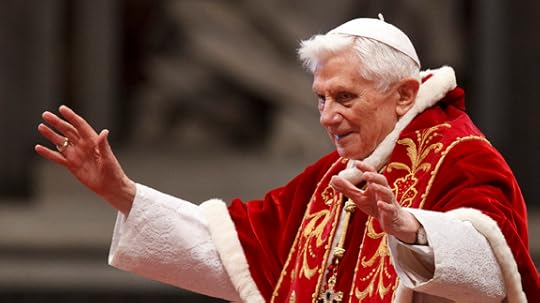
Pope cites waning strength as reason for resignation | Catholic World Report
First pontiff to resign in almost 600 years
Vatican City, Feb 11, 2013 / 07:20 am (CNA/EWTN News) - Pope Benedict XVI told a gathering of cardinals Feb. 11 that he no longer has the strength to carry out ministry and will resign on Feb. 28.
“I have convoked you to this Consistory, not only for the three canonizations, but also to communicate to you a decision of great importance for the life of the Church.
“After having repeatedly examined my conscience before God, I have come to the certainty that my strengths, due to an advanced age, are no longer suited to an adequate exercise of the Petrine ministry,” Pope Benedict said.
He made his remarks in Latin to a meeting of cardinals who were gathered to vote on whether or not to canonize three people.
The last pontiff to resign was Pope Gregory XII, who resigned in 1415.
At a quickly arranged Feb. 11 press conference, Father Federico Lombardi told the media that there is no sickness the Pope is suffering from that is behind this decision.
“It’s something that happens normally in people with advanced age,” the Vatican spokesman said.
Pope Benedict observed his lack of strength “over the past few months and courageously came to this decision,” the spokesman said.
He also stressed that Pope Benedict made the decision after carefully examining his conscience and the responsibilities of his office.
“This is an absolutely personal decision made with his conscience before God,” he remarked.
One member of the press commented on the contrast between Pope Benedict and Pope John Paul II, who suffered with Parkinson’s disease until he passed away on April 2005.
Fr. Lombardi said Benedict XVI respects the decision of his predecessor and that with his suffering he offered a great testimony to the Church.
The Relevance of Holiness: St. Bernadette and Lourdes

The Relevance of Holiness | Patricia A. McEachern, Ph.D. | The Introduction to A Holy Life: St. Bernadette of Lourdes | Ignatius Insight
On a cold winter day in 1858 in Lourdes, France, Bernadette Soubirous, a tiny, asthmatic shepherdess went in search of wood along the Gave River. The visions this humble young girl experienced that day has since deepened the faith of millions.
Bernadette could scarcely believe her eyes when a beautiful Lady appeared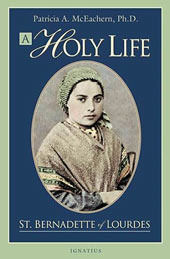 before her. Eventually, she would come to understand that it was the Holy Virgin Mary herself who had appeared to her that day and on seventeen subsequent occasions. Church authorities could not have been expected to believe immediately that the Virgin Mary had appeared in a grotto where pigs took shelter from the thunderstorms that sometimes raged through the countryside surrounding the small village in the Pyrenees. Even more unlikely was that she would have enlisted the aid of a poverty-stricken, uneducated girl whose family had been reduced to living in a former jail cell condemned as too unhealthy even to house prisoners.
before her. Eventually, she would come to understand that it was the Holy Virgin Mary herself who had appeared to her that day and on seventeen subsequent occasions. Church authorities could not have been expected to believe immediately that the Virgin Mary had appeared in a grotto where pigs took shelter from the thunderstorms that sometimes raged through the countryside surrounding the small village in the Pyrenees. Even more unlikely was that she would have enlisted the aid of a poverty-stricken, uneducated girl whose family had been reduced to living in a former jail cell condemned as too unhealthy even to house prisoners.
It was highly improbable that the Immaculate Conception herself would choose this fourteen-year-old girl whose own living conditions were so very far from immaculate. Bernadette understood that the Blessed Mother had demonstrated great humility in appearing to her, conversing with her and asking for her aid, and asking so kindly and respectfully. Bernadette would spend the rest of her brief life trying to follow the example of humility that the Queen of Heaven herself had shown to her.
The story of Saint Bernadette Soubirous of Lourdes has exerted a powerful influence on the spiritual lives of millions of people for a century and a half. Scores of writers, be it scholarly, religious or secular, have written about Saint Bernadette and her visions of the Holy Virgin Mary at the Grotto of Massabielle. Bernadette is typically portrayed as an honest, but illiterate and uncatechised young girl, as she was at the time of the apparitions. The catechist who prepared her for her First Communion went so far as to claim that she was incapable of learning, and Father Pomian, her confessor, accurately referred to her as a tabula rasa, that is, a blank slate. Indeed, she was thoroughly uneducated when the Holy Virgin Mary first appeared to her.
Hence, it comes as a surprise even to her most ardent dévotés that in reality Bernadette became a prolific letter writer; she even corresponded with Pope Pius IX to ask for his apostolic blessing. In addition to her letters, Bernadette compiled a tiny anthology of Private Notes in which she carefully recorded quotes, reflections, prayers and spiritual advice. More than any other document, her Private Notes offers a glimpse into the profound spiritual life of this "most secret of saints". Her letters were not collected and published in the original French until the late twentieth century and they are translated into English here for the first time.
Saint Bernadette is as relevant now as she was in 1858 because the message of Lourdes is conversion, and Bernadette lived that message. On August 14 and 15, 2004, Pope John Paul II made his second papal visit and pilgrimage to Lourdes to celebrate the 15oth anniversary of the proclamation of the Immaculate Conception as dogma. The year 2008 marks the one hundred and fiftieth anniversary of the apparitions when the Holy Virgin appeared to Bernadette and confirmed this dogma with the words: "I am the Immaculate Conception." An uncatechised tabula rasa like fourteen-year-old Bernadette Soubirous would not have heard the expression "Immaculate Conception" in the tiny, isolated mountain village of Lourdes.
When Bernadette told Father Peyramale, her parish priest, that the Lady who appeared to her in the Grotto had identified herself with these words, he responded that she could not have said such a thing because conception is an event, and a person cannot be an event. Nevertheless, this expression is a grammatical parallel of the words of Jesus Christ himself when he said: "I am the resurrection and the life." These expressions are grammatically illogical, yet spiritually true. How could an uneducated shepherdess have made such a grammatical parallel on her own, a fascinating parallel that evidently her parish priest did not recognize?
Saint Bernadette continues to attract millions of pilgrims to the French towns of Lourdes and Nevers, just as she did when she was living. Each year, thousands of pilgrims pray before her incorrupt body at the chapel of Saint-Gildard, the convent in Nevers where she lived and died. Since the time of Bernadette's visions, Lourdes has become the most frequented Marian shrine in Europe and is one of the greatest healing centers of the world. It boasts an average of one authenticated miraculous cure every two years (the latest in 1999) as well as thousands of cures that either cannot be investigated by the Medical Bureau or cannot pass its uncompromising standards.
In 1990, so many pilgrims visited Lourdes that a "holy-water shortage" was temporarily declared, and for the first time in its history there was rationing. An unlikely ensemble of authors and periodicals have written about Saint Bernadette Soubirous and the healing waters of Lourdes, including the New York Times, William E Buckley, Jr., Time Magazine, The Economist, Emile Zola, J.-K. Huysmans, Francois Mauriac and Franz Werfel. A wistful and reverent example of Bernadette's continuing influence is evident in Leonard Cohen's plaintive folksong entitled "The Song of Bernadette", in which he pays tribute to the visionary in an intensely personal way. The story of Bernadette Soubirous and the "beautiful Lady" of her visions has captivated people for one hundred and fifty years, but until now we have only been able to know her through articles, books, films and songs. At last we have the opportunity to meet Bernadette through her own words.
When the cause for canonization was opened for Saint Bernadette, it was due in large part to her popularity as an exemplary model for Christians seeking to live a devout life. It is only in her writings, however, that we can begin to see past her veil of secrecy and realize the depth of her spirituality. It is true that Bernadette is famous for her extraordinary experience of having been favored with visions of the Holy Virgin and because of her participation in bringing forth the spring that would heal many; however, the story of her courageous struggle for holiness is perhaps even more extraordinary than her visions. At the age of eleven, she contracted cholera, a disease that stunted her growth permanently. She never grew any taller than the child-like height of approximately 4 feet 7 inches. In addition, the ravages of cholera left her with severe, chronic asthma and eventually she contracted tuberculosis of the lungs and bones. She was given last rites on four different occasions.
Bernadette suffered terribly for many years before her death at the age of thirty-five, but her response to suffering was genuinely heroic. This humble, self-effacing nun transformed excruciating suffering into spiritual fecundity. Her letters and Private Notes serve as a model for those who are passing through their own trials. Bernadette's writings are permeated with her strong desire for humility, her ever-present expressions of gratitude and her deep appreciation and love for the Eucharist. They reveal an intimate and profound love for God the Father, Jesus and Mary. Anyone interested in pursuing a deeper spiritual life or in knowing Bernadette as she truly was and in her own words will appreciate the person that the pages of this volume reveal: a humble soul, with her own human frailties, who sought holiness.
Related Links and Articles:
• "This book is the fulfilment of my vow" | The Preface to The Song of Bernadette | Franz Werfel
• Interview with Sydney Penny, star of the movie, "Bernadette"
• "Holy Visions" | An article about Dr. McEachern and A Holy Life on the Drury University website.
• Forty-Four Hours in Lourdes | Stephen Sparrow
• Glorifying God with Children's Cinema | An Interview with Jim Morlino, President of Navis Pictures
Patricia A. McEachern, Ph.D., received her doctorate in French Literature from the University of North Carolina at Chapel Hill and her Master's Degree from Florida State University. In 1990, she earned a graduate exchange position with the prestigious Ecole Normale Supérieure, rue d'Ulm in Paris, where she studied with French philosopher Jacques Derrida. She has been teaching at Drury University since 1996.
She is also the author of Deprivation and Power: The Emergence of Anorexia Nervosa in Nineteenth-Century French Literature, Lourdes: Reverencing the Source as a Source of Healing. Dr. McEachern In addition to teaching all levels of undergraduate French, she has taught an Honors Course on Free Will vs. Determinism and she is responsible for the team-taught Animal Ethics course.
Unlearning Christianity
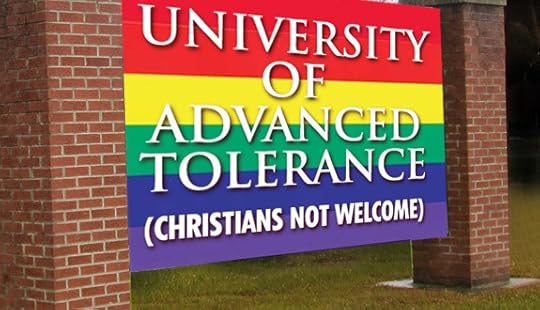
Unlearning Christianity |
Benjamin Wiker | Catholic World Report
A review of Gregory Lukianoff’s Unlearning
Liberty: Campus Censorship and the End of American Debate
Gregory Lukianoff’s Unlearning
Liberty: Campus Censorship and the End of American Debate is well worth the read, even with the criticisms I’ll
be making of it. Lukianoff is a self-declared liberal and atheist, but one who
believes in free speech and works tirelessly for it through his Foundation for
Individual Rights in Education (FIRE). That makes his book all the more
important for Christians—FIRE is not the ACLU. Lukianioff and FIRE are actually
working for free speech, rather than, with the ACLU, attacking Christianity at
every turn and trying to establish secularism and atheism.
Lukianoff wants fairness, and that brought him to a very
interesting realization about who is actually getting treated unfairly on our
campuses today. “If you told me twelve years ago,” Lukianoff confides, “that I,
a liberal atheist, would devote a sizable portion of my career to defending
Christian groups, I might have been surprised. But almost from my first day at
FIRE, I was shocked to realize how badly Christian groups were often treated.”
As Lukianoff amply documents, on campuses across the nation
persecution is directed at Christians by secular liberals intent upon imposing
uniformity in the name of diversity, complete intolerance in the name of
tolerance, liberal absolutism in the name of relativism—and all this with
identifiably religious zeal in inculcating the far Left’s beliefs as orthodoxy.
I know whereof he speaks. Twenty-five years ago I saw it
firsthand during my graduate school experience earning my Ph.D. at Vanderbilt
University. Even mild disagreement with the “politically correct” party line
was met with hysterical accusations and verbal attacks. Not arguments, mind
you. I was informed by one well-indoctrinated young woman that rationality and
logic were instruments of male domination, and that she would have no part of
them. She was good to her vow, as were her mentors. It was very clear what one
was allowed and not allowed to say, and which moral and political positions
were considered clean and unclean, and the unclean were not permitted to speak.
My experience was not unusual. The combination of liberal dogmatism
backed up by institutional authority is still the rule, not the exception, in
academia. And in fact, it has gotten far worse, both on the graduate and even
more on the undergraduate level, since I was in school.
Today, for example, incoming students routinely undergo
intensive indoctrination during freshman orientation week, and it continues for
the rest of the year, administered in regular doses by heavy-handed
propagandists in the administration, among the faculty, and through converted
students (especially the RA’s that oversee dorm life).
Carl E. Olson's Blog
- Carl E. Olson's profile
- 20 followers


